How We Passed the Certified Kubernetes Administrator Exam
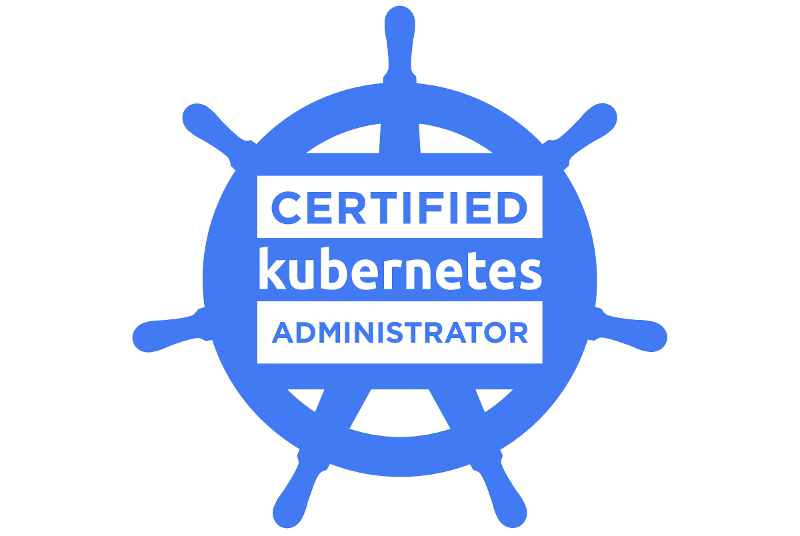
Last year, the CNCF (Cloud Native Computing Foundation), an organization that helps develop Open Source projects such as Kubernetes and Prometheus, launched the CKA (Certified Kubernetes Administrator) certification program. At the beginning of this summer, we decided to participate in it and received the first certificates for our employees. We are pleased to tell all curious readers of the Habr that this, why and how it is happening.
Foreword
Over the past years, the Kubernetes project has become really big, gathering around itself many stakeholders: both vendors and users (system administrators and developers), and third-party enthusiasts. This led to a logical turn in its formation - the need for standardization and certification.
So programs for partners , standards for K8s distributions, and, of course, exams for specialists began to appear .
In March 2017, the CKA exam program was first published , the repository with which is maintained to this day (the last time it was updated earlier this year). Its main content is a PDF document of the same name :
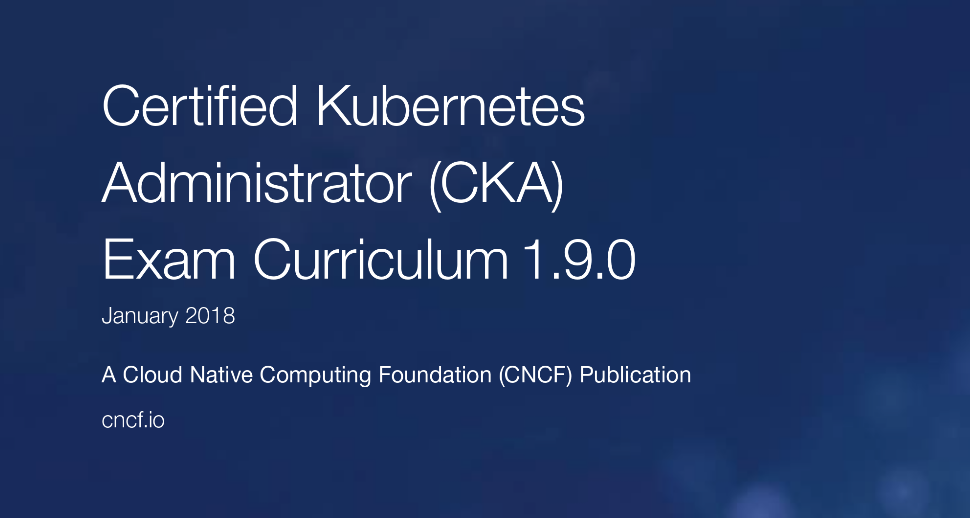
... from which you can find out what topics the exam touches and how these topics are distributed (as a percentage) throughout the assignment.
On June 15 of the same year, CNCF announced the start of a beta test for the exam. Even then, five of our engineers applied for participation in this event:
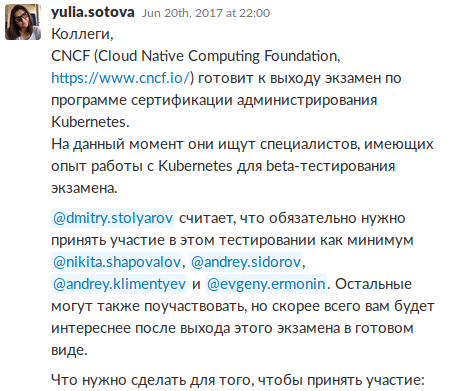
... however, for some reason they didn’t receive any answer ... And we waited for the official start of the exam to participate in it already “fully”.
Why do we need this?
A rather popular reaction among many to receive any kind of certificates is the question “Why?”:
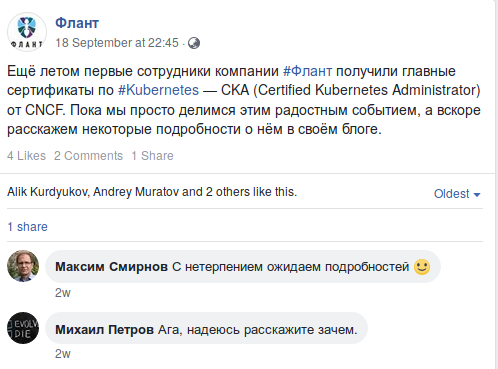
Without claiming to discover America and the universality of our answer to this question, we just fix it here for those who need it:
- It’s useful to test your knowledge and skills, and in this case the test was prepared by the “most important” organization (CNCF with the support of the parent The Linux Foundation), which gives reason to rely on professionalism and objectivity. (By the way, Kubernetes exams from other companies are already available - for more details, see the end of the article.)
- Despite the fact that the availability of certificates does not guarantee any contracts, and for many such formalities are simply indifferent, this is still an additional argument in marketing and in the market, even for those cases when “you already know”.
- Engaging in such initiatives is an obvious help for the Kubernetes project and its related community.
Training
I must say right away that passing the exam involves signing an agreement that includes a clause on confidentiality prohibiting the disclosure of details about assignments. Therefore, we are very limited in the story about what specific questions await you and how to prepare for them ...
Nevertheless, the already mentioned PDF-document contains a rather detailed list of topics “where to dig”. We created an internal exam preparation document that also included the following links:
- detailed (. 27 pages) manual Candidate Handbook , which was updated in August of this year, and contains complete instructions on exam technique and its passage (as being registered, what tools are available in the examination time, and what can be done, what is the policy retake ...);
- concise (3 pages) tips for passing the exam - they were updated in July 2018 and tell only about the technique (partially duplicating fragments of the Handbook): available terminal capabilities, the version of Kubernetes used (1.11), general information about clusters waiting for you in tasks etc;
- as the main tool for preparation, we considered catalogs of resources grouped by official topics: one and two ;
- No special introduction to Kubernetes The Hard Way ;
- simple ways to get a test cluster with Kubernetes: Katacoda and Play with Kubernetes (we already wrote about the latter in a blog) .
In addition, we especially draw the attention of employees to an understanding of the following issues:
- how to use the built-in kubectl filters ;
- the entire deployment cycle of an application without using Helm;
- How to diagnose the health of a cluster.
Finally, a number of other publications on this topic can already be found on the English Internet. They contain [minor] additions - somewhere to prepare, and somewhere to the exam process itself. For instance:
- " How Heptio Engineers Ace the Certified Kubernetes Administrator Exam ";
- discussion " CKA Exam advice / tips / tricks? "On Reddit;
- “ Things to know before taking Certified Kubernetes Administrator (CKA) Exam .”
Another, as if “remaining behind the scenes,” the requirement for many will be obvious, but still. The only official language for the CKA exam is English . This means that you: a) must read and understand all the technical questions in the assignments, b) must have a minimum of spoken English in order to understand and follow the verbal instructions of the examiner during the session.
How long does the preparation take? The answer is predictable: everything is very individual. To illustrate, here are a few examples:
- Our technical director Dmitry Stolyarov ( distol ), who by nature prefers to prepare very carefully for anything, spent a total of 8 hours.
- One of our engineers, who came to our company without Kubernetes knowledge and, according to him, “spent half a year or a year (?) On acclimatization to Kubernetes,” prepared about 6 hours before the exam itself.
- But if it was about people who have practical experience with Kubernetes, there is a downside ... We came across a radically different example of a specialist who bought the exam preparation course from The Linux Foundation and spent about 4-5 weeks on all of this.
By the way, this online course is Kubernetes Fundamentals (LFS258) . It includes materials for 35 hours (they are available within a year after payment) on the following topics:
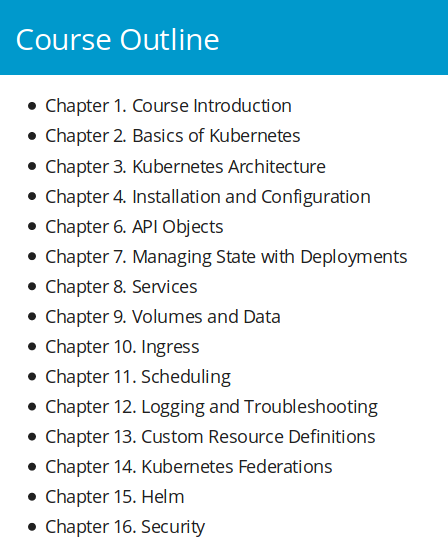
Cost - 299 USD, and with the CKA exam - 499 USD (you get a saving of 100 USD). As a preliminary preparation for this course, the authors mention the free Introduction to Kubernetes (LFS158) , which we wrote about on the blog. However, I remind you that our engineers have no experience passing the LFS258 (including in preparation for the CKA).
The final touch: in order for the exam to take place, you need a stable Internet and a working webcam, which is easy to move in any direction, as required by the "overseer"(Proctor) .
Process
“The creators of the exam managed to achieve a unique state of the examiner: you can only rely on yourself, no outside help. Proctor (a person who is not from the IT sphere at all) does not understand anything that happens in the exam, but only carefully looks at your screen and webcam. On the webcam I even asked to show the ear canal. ”
- impression of the exam through the eyes of our engineer Andrei Klimentyev ( zuzzas ).
In the mentioned agreement for the exam there are rather strict requirements for the place of its conduct and the process itself. In particular, the location should not be public, the room should be private (people except the candidate himself are not allowed) and well-lit (but without bright light from windows / lamps behind the candidate), the desktop should be completely empty (without any devices, pieces of paper and etc.). It is forbidden to communicate with anyone, use third-party devices, notes, notebooks, documentation (except for official technical documentation of the Kubernetes project) ... The candidate is not even allowed to eat or drink (for this you can request a break):
“I was punished for drinking water. And I didn’t even think about it, because I really like to hydrogenate myself. ” - zuzzas
And here is an even more “frightening” experience with the words distol :
“The worst thing for me was the ban on covering my face.” Many people, when they think, do this or that . And I need to knead whiskey / eyebrows, and I do it with one hand - something like this ; only a hand covers the whole face . Accordingly, I made two comments at the beginning and spent the whole exam taking significant steps to keep my hands on the keyboard. ”
Andrei Polov ( driusha ) echoes his colleagues :
The most difficult was the expectation of some terrible exam and the very procedure of passing in a Western manner, where it is considered shameful to write off. During the exam I had to get comments for seemingly harmless actions: the habit of mumbling my thoughts under my nose and - the most unpleasant thing for me - looking to the side to warm up my eyes ...
Direct examination takes 1.5 hours.
Total
Regarding the technical content of the exam, our impressions are as follows:

Or from driusha :
“The essence of the exam turned out to be quite feasible to anyone who had real experience working with Kubernetes. If this is about you, then your chances are very high. "
What else our candidates advise to pay attention to after completing the CKA is the competent planning / allocation of time for tasks.
At the end of the exam, the results are determined automatically, but they do not become available until they are checked manually. E-mail with the final result arrives within 36 hours after delivery.

If you failed to pass the CKA immediately, then the cost of the exam includes one free attempt to retake. However, none of our experts have yet needed it. Good luck to you too!
Addition
There are several more Kubernetes certification programs. Firstly, CNCF itself prepared an exam for developers - Certified Kubernetes Application Developer (CKAD) . In it, candidates are tested for "the ability to design, create, configure and publish cloud native-applications for Kubernetes", which implies the presence of skills to determine the resources for the application and use the basic primitives for subsequent work with them (i.e., build, monitor, diagnose problems ) Cost - 300 USD.
Secondly, exams from other vendors have already appeared:
- Kubernetes & Docker KCM100 by Mirantis . At the time of its appearance (December 2016) it was positioned as the first certification in the world, formally independent of the supplier. Consists of 30 questions in which the Docker / Kubernetes ratio is 20 to 80%. Cost - 600 USD.
- EX280 from of Red Hat , that sounds like a full Red Hat Certified Specialist in OpenShift Administration. It is easy to guess that the exam questions are not about the upstream distribution of Kubernetes, but OpenShift (to be more precise, the current version is based on Red Hat OpenShift Container Platform 3.9). Cost - 450 USD.
But personally, we didn’t seriously look at them - at least for the moment.
PS
Read also in our blog:
- “The Linux Foundation has introduced a free introductory online course on Kubernetes ”;
- “ Play with Kubernetes - a service for practical acquaintance with K8s ”;
- “ Our experience with Kubernetes in small projects (review and video report) ” (includes a brief introduction to Kubernetes) ;
- “ Infrastructure with Kubernetes as an affordable service ”;
- " New CNCF statistics on containers, cloud native and Kubernetes ."
